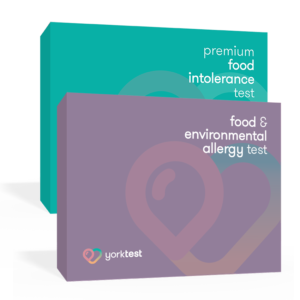During International Stress Awareness Week, we regularly get asked about the relationship between food and mood here at yorktest. It’s the subject of much discussion and, of course, an ever-growing body of research as a result, but what exactly is at play when we talk about gut health versus mental health?
Can food affect mood?
In a survey commissioned by Allergy UK, we found that 97% of our customers reported experiencing low mood as a result of their food intolerance. Additional research has demonstrated that food intolerance symptoms like gastrointestinal inflammation are often found in people who suffer from depression.
A condition like dairy intolerance can affect daily life in such a way that it forces changes to routines and renders people unable to eat and do what they want, which means it could have a direct impact on how people feel if they don’t endeavour to cut it out of their lives with a food-specific IgG-guided elimination diet.
There is increasing evidence of the impact that the make-up of the gut microbiome can have on mental health, but can the relationship work both ways? Can greater levels of stress increase one’s susceptibility to a food intolerance?
What is a food intolerance?
Let’s first define what a food intolerance is and what symptoms it can exhibit before we explore how it might be connected to other conditions such as stress.
An intolerance occurs when the immune system identifies certain food proteins as ‘foreign’ and produces IgG antibodies to fight them off – the resulting symptoms can include low energy, abdominal pains, bloating and headaches.
Food intolerances can be developed at any point in a person’s life, so they are not hereditary. Significant changes to diet or lifestyle can result in significant changes to how the body deals with food. These changes don’t have to happen overnight either; they can develop over a long period of time.
It goes without saying that prolonged exposure to harmful foods and drinks laden with saturated fats, salt and sugar – or, in other words, a prolonged lack of essential vitamins, minerals and nutrients – can have a negative effect on the strength of the immune system. If the body and mind aren’t given the fuel they need to function properly, they become weakened and more prone to negative reactions, such as those that are typical of food intolerances.
When you consider that a weakened immune system leaves the body and mind exposed to a wide range of harmful conditions, it can be considered that the symptoms of food intolerances and those of other conditions could be interlinked.
The link between stress and food intolerance
In short, the symptoms of stress could be responsible for flaring up the symptoms of a pre-existing food intolerance, rather than being a direct cause of them.
It’s true that the immune system can be weakened by heightened levels of stress for prolonged periods of time, but there is no evidence to suggest that stress can directly cause a food intolerance. It is more a case of chronic stress making the immune system more exposed, vulnerable and sensitive to ‘foreign’ bodies, which can include viruses, harmful bacteria and what the body interprets as aggressive trigger foods.
A greater sensitivity to such foreign bodies could lead to more severe or obvious symptoms, but this can often lead to confusion and misdiagnoses, especially when the symptoms of an intolerance can take up to three days to appear.
The symptoms of stress can sometimes be quite similar to those of a food intolerance, such as itchy skin, fatigue and headaches and migraines, so some people are inclined to self-diagnose an intolerance even if one is not present. It can be easier to blame a problem on one’s body rather than one’s mind.
When this happens, either the symptoms of stress become ignored or the removal of what is believed to be the trigger food from the diet leads to depleted nutrition. In a worst-case scenario, both of these things could be true: someone who is stressed and has inadvertently removed essential vitamins and minerals from their diet could exacerbate their symptoms even further.
If you are experiencing any symptoms similar to the above, it is important that you see a GP to determine what the causes are instead of diagnosing stress, a food intolerance or both yourself.
Do you need to take a food intolerance test?
If your GP determines that there may be a food intolerance at play, we can help to identify what it is with a FirstStep test and a FoodScan programme so you can make the necessary adjustments to your diet and lifestyle.
We analyse all four sub-types of food-specific IgG to give you the full picture of your food fingerprint and, as part of the FoodScan programme, we provide the comprehensive nutritional support that will help you change your life for the better.
Get in touch today to find out more.











